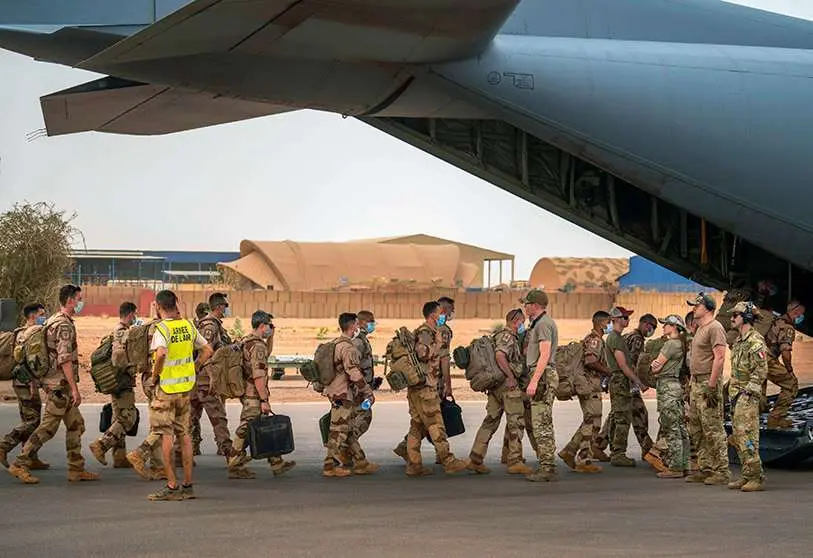What is France's current situation in the Sahel?

The military exit from Mali took place on 15 August, coinciding with the withdrawal of international troops from Afghanistan a year ago. This departure took place from the Gao base, from where the French troops crossed into Niger.
As promised by President Macron, the Barkhane force in Mali has withdrawn from the country in less than six months and after nine years of military presence.
But France is not withdrawing from the Sahel or from the fight against terrorism, which is why it has reorganised Operation Barkhane outside Malian territory.
What is clear is that France's withdrawal from Mali has led to greater insecurity in the country, as well as in Burkina Faso and access to a larger area of influence for Russia, which has become a new actor in the region.
France's case in Mali is similar to that of the US in Afghanistan, where after years of intervention and economic, military and human expenditure, it has proved incapable of achieving its objectives in terms of security and stabilisation of the country.
It should be recalled that France has not left Africa, but remains committed to the Sahel from its new position in Niger and is also present in the Gulf of Guinea and the Lake Chad region.
However, the failure in the region is not only France's, but also that of the states that make up the Sahel, which in most cases are unable to control a large part of their territory, which is why in recent months we have seen a succession of coups d'état in Chad, Guinea and other nearby countries, in addition to Mali, due to the discontent of the population over the continuing situation of insecurity.

France now finds itself in a different situation in the Sahel with its exit from Mali and its repositioning in Niger to continue the fight against jihadist terrorism. From Niger, France will act by land and air and make use of its special forces, with a strong presence on the tri-border area.
There should also be greater cooperation between the tri-border countries: between Burkina Faso, Mali and Niger in order to overcome this long border strip with Mali. With Niger, such bilateral cooperation already exists through the joint operation Taanli, an operation that takes place regularly every six months. And with Mali, Burkina Faso is seeing to what extent it can actually obtain bilateral cooperation after the last meeting between the two countries.
Another important actor in the area is Algeria, which could play an important role in conflict resolution by offering its expertise, particularly through dialogue with jihadist groups.
France will now be in Chad and Niger, essential partners in this area, and as they did in Mali they will intensify their efforts to train their forces in the fight against terrorism.
Beyond operational support, we are now facing a hybrid threat in the Sahel, so France's cooperation with other actors in Africa, who are on the frontline in this fight, will also focus on joint actions in the field of information or cyber warfare.
If France leaves Mali, it is at the request of the new Malian authorities and always respecting Mali's sovereignty, but also recalling all the work France has done over the past nine years in the fight against terrorism and the economic and human cost it has entailed.
The Sahel is a very complicated scenario and the approach must be both military and non-military. In the military sphere, greater priority must be given to intelligence operations combined with joint operations with other actors in the area, and this must be done in a coordinated manner.
France has focused its strategy in the Sahel on the military sphere, and in the case of Mali it has supported an unpopular president like Keita and opposed the new junta that had the full support of the Malian population.
If there is a lesson to be taken into account, it is the need to take in consideration all the actors involved in the area, the protection and perception of the civilian population and local realities, a lesson that so far does not seem to have been considered.
The strategy in the Sahel should be based on what has been called the 3-D strategy: Defence, Diplomacy and Development. While France has focused all its capabilities in the area of defence, it has failed in the area of diplomacy and development.
France has understood that it is necessary to change the model of strategy in the Sahel and that it must stay in the Sahel because the violence that exists there poses a serious security threat, because of the links with France and the interests in the area, and because of the recent arrival of Russia and Turkey.
This is why we are facing the end of a cycle that must be managed with a new strategy that involves a new intervention model in which, based on the lessons learned, we begin to work effectively in the Sahel, starting by rebuilding the states in all areas, not just the military, and dedicating special attention to the civilian population and local action, otherwise we will be making the same mistakes all over again.

